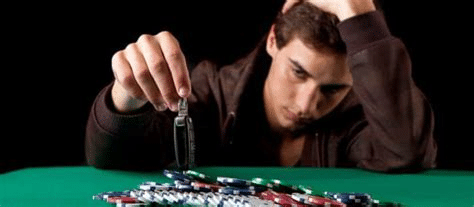How to Gamble Responsibly: A Guide to Keeping Safe
If you’ve ever seen a gambling advert, you’ll probably we aware that a ‘please gamble responsibly’ message is habitually included somewhere. Despite this, gambling responsibly can be easier said than done for thousands of people all across the UK. Not only can gambling be fun, it can be thrilling and for some vulnerable people, that thrill can become addictive and lead them into rash decision-making, especially when it comes to the amount of time and money that they spend pursuing gambling.If you’ve ever found yourself at the edge of irresponsible gambling, or if you are currently struggling with your gambling, then this page is for you. Learn how to recognise that you spending too much time, money or both gambling, how you can prevent this from happening, and the steps you can take to step back from gambling including important support resources.
Why We Gamble
Gambling is fun. If you are watching a football match, betting on one side to win can make it more thrilling as you are exposing yourself to risk. You could lose money or win money, depending on the outcome of the match.
The human brain is very good at rewarding itself when we experience pleasure. You’ve probably heard of ‘dopamine’, but may not know what it is. It’s a chemical called a neurotransmitter, and it’s what makes us feel ‘happy’ – or at least that is one of its roles.

One of the jobs that dopamine does is to influence us to experience … more dopamine. The brain finds itself in a ‘risk and reward’ cycle – dopamine is released in anticipation when we enter a risky situation, and then more dopamine is released when there is a positive outcome to that risk. For some people, that means they are physical risk-takers in that they take on ‘risky’ physical activities (even as mundane as playing a friend at tennis) in the expectation of the reward (winning the game).
We don’t like it when our risk has no reward
Unfortunately, one of the things that our brain is not good at is accepting that sometimes there is no reward when we take a risk. The anticipation of the reward leaves us feeling low when it doesn’t come – when our backed team loses, or when we don’t obtain the result that we were expecting.
The majority of people can simply shrug off this lack of reward, but some people cannot. The feeling of the need for reward is so great that they just really need to experience it. This means that if the anticipation fails to gain its reward, reward must be sought elsewhere, which is usually by the placement of another wager, which carries the threat of an endless cycle of risk-taking and reward-expectation.
One other thing our brains are not good at is keeping the levels of dopamine it releases consistent. Winning a £10 bet in January, for example, is less likely to be rewarded with the same feelings as winning a £10 bet in February, and we’d need to win a £20 bet in February to feel the same. This will become a £40 bet in March, £80 in April and so on. By the end of the year, we may need to win a £20,000 bet in order to feel the same as winning £10 twelve or so months ago.
One more thing our brains are good at – creating habits
The first time you drive to some brand new place you’re careful to listen to the sat nav, or look out for landmarks, or even stop to ask for directions (unless, of course, you’re a man). By the tenth time, you know the route off by heart, so you barely notice where you’re going. By the 100th time, you get out of the car at your regular destination and realise you’ve absolutely no idea how you go there.
Our brain likes us to form habits. It doesn’t want to have to go through the exact same process dozens and dozens of times, so once we do something a number of times, the active part of the brain passes responsibility off to the subconscious, which is an area of our minds that’s capable of performing actions that do not need our full awareness.
Humans are very good at forming habits, even if they are bad for us. If we associate something with something else – such as watching a movie while drinking a bottle of wine – then our brains will form this habit, so eventually we’d find it difficult to watch a movie without a bottle of wine.
The same can eventually be applied to betting. If we bet often enough, then betting becomes a habit that becomes detached from our original reasons for doing it – which could have been for fun, or to hopefully win money. Once betting becomes a habit we will start to find it hard not to do it, even though there’s no risk feeling, or reward that we care about. This can lead to betting when we don’t even feel that there’s any need for us to do it.
Gambling can become too emotional
There are a lot of emotions involved in gambling – the anticipation of the event on which we bet, the hope that we’ll win, the emotions of watching the event (if we choose to), the happiness of winning, the disappointment of losing, the concern that we are betting too much, the fear (if we are betting when others have said that we ought not to) of being found out … all these emotions can lead to emotional turmoil.
Gambling can only be done safely if it done logically. Logically also means honestly, such as having the awareness of recognising when our gambling is inappropriate, or where the risk makes the potential reward not worth it. Unfortunately, emotion is logic’s worst enemy. We seldom make logical decisions when we are influenced by our emotions, which can lead to dire consequences when we make illogical decisions on a repeated basis.
Gambling also involves money, which is another aspect of life to which huge levels of emotion can be attached, especially if money that was needed elsewhere has been lost to gamble, or if money has been loaned or even stolen to fund gambling, or if substantial gambling losses are experienced. Gambling while emotional seldom ends well.
In conclusion, gambling can be and should be fun. Once it stops being fun, it’s time to stop gambling, however recognising when that point has arrived can be difficult.
Responsible Gaming – Facts and Figures
The following information is derived from the UKGC’s ‘Statistics on participation and problem gambling for the year to March 2023’.
- In the year prior to March 2023, 44 percent of the UK population admitted they’d participated in some manner of gambling activity during the previous four weeks
- During the same period, 27 percent admitted in-person gambling (i.e. any form of gambling that is not participated in online)
- The percentage of the UK population who use online gambling sites stands at around 26 percent
- Of those, around 0.3 percent (over 36,000 individuals) were deemed to be at high risk of gambling addiction, while 1.2 percent (146,000) were deemed to be at moderate risk, and 1.8 percent (220,000) at low risk
- Around 25,000 people call the National Gambling Helpline each year, with 65 percent of them being male, and 35 percent of them being female
- 11 percent of those calling the NGH admitted their gambling had caused them to have suicidal thoughts, while 66 percent admitted their gambling had left them facing financial difficulties, and 45 percent saying their gambling had caused problems with their relationships.
Tools And Strategies For Responsible Gambling
Tools and strategies for responsible gambling play a vital role in promoting a safe and enjoyable gambling experience. Here are some key tools and strategies that can help you engage in gambling in a responsible way:
Self-Exclusion Programs
Deposit Limits
Reality Checks
Responsible Gambling Education
Reaching Out To Support Organisations
Bankroll Management
Open Communication
Self-Assessment; Assessing Your Gambling Habits and Recognising Warning Signs
It can be difficult to recognise that you have a gambling problems. Humans are very good at fooling themselves in order to continually give themselves permission to practise and repeat harmful habits. Very few people happily go through their entire lives without forming some kind of harmful habit, such as eating too much, drinking too much alcohol, smoking, not exercising enough or engaging in behaviours that are harmful to others. Those that are successful in conquering their unhelpful habits are those that take that first important step in recognising that they have a problem in the first place.

Here are a few tips that will help you recognise whether your gambling is putting you at risk of developing gambling problems, or that the levels of your gambling have already reached problematic levels.
Increased Preoccupation with Gambling
If gambling dominates your thoughts and becomes a primary focus in your daily life, it may indicate a problem. Constantly thinking about gambling, planning future bets, or reliving past wins or losses could be a red flag.
Difficulty Controlling Gambling
Losing control over your gambling habits is a significant sign of a problem. If you find it challenging to set limits on time and money spent gambling, repeatedly exceed your planned budget, or experience intense cravings to gamble, it may indicate a problem.
Neglecting Responsibilities and Relationships
When gambling takes precedence over responsibilities such as work, family, or social commitments, it could be a clear indication of a problem. Neglecting personal relationships, experiencing conflicts due to gambling, or failing to meet obligations are warning signs to watch out for.
Financial Consequences
Experiencing financial difficulties as a result of gambling is a strong indicator of a problem. If you find yourself borrowing money, selling possessions, or resorting to illegal activities to fund your gambling habit, it’s essential to accept that your gambling has grown beyond your control.
Emotional Distress
A gambling problem can lead to emotional distress, including feelings of guilt, shame, anxiety, or depression. If you experience significant mood swings related to gambling, become irritable or restless when attempting to cut back or stop, it may suggest a problem.
Need for Increasing Stakes
Developing a tolerance to gambling and needing to bet larger amounts to experience the same level of excitement or satisfaction is a sign of a problem. Chasing losses, constantly seeking the ‘big win’ or feeling restless when not gambling may indicate an escalating gambling habit.
Budget and Bankroll Management
While many accept the importance of bankroll management in line with responsible gambling, a few people have no idea how to do it. The following describes one suitable bankroll management system that is known as the ’10-10-10 rule’.
The first step is to work out your monthly income, post-tax. The second is then to take off all life’s absolute essentials – what you need to keep a roof over your head, and food on your table. Include utility bills such as water, gas, electricity, council tax and insurance payments for example.
Next, take off the frivolous. The amount you spend each month on socialising, going to the gym, indulging in hobbies (not including gambling!) – anything that you don’t want your gambling to reduce you doing.
You should now have a maximum figure of your available gambling funds. If you think the figure is too great, then that’s fine! Reduce it until it looks more comfortable – just to be clear, this is the amount of money you’re comfortable losing to gambling in one single calendar month.
Let’s say that your bankroll is £200 – this is your monthly bankroll. Your daily bankroll is one tenth of that, and your maximum stake is one tenth of your daily bankroll. Your stake doesn’t have to be one tenth of your daily bankroll – just as long as it doesn’t exceed that amount.
Now that you have calculated your losses, it’s time to follow the follow two important rules:
- If, at any time of the month you completely deplete or you double your monthly bankroll, then you stop gambling until your next monthly bankroll becomes available.
- If, at any time during a single day your completely deplete or you double your daily bankroll, then you stop gambling until your next daily bankroll becomes available.
Two further, important tips. Don’t be tempted to ‘borrow’ from next month’s bankroll to keep your gambling for the month going, and if you end up at the end of the month in profit, then go and spend that profit on something else. It’s always preferable if the rewards for gambling success are more than just more gambling.
Helplines, Counselling and Organisation for Responsible Gambling in the UK
In the UK, several organisations are available to provide support and assistance to individuals experiencing gambling problems. These organisations offer helplines, counselling services, and resources to help individuals overcome gambling addiction.

GamCare is the leading national provider of information, advice, and support for anyone affected by problem gambling. They operate the National Gambling Helpline (0808 8020 133), which provides free and confidential support 24/7. GamCare offers a range of services, including counselling, live chat, online forums and self-help resources. They also provide education and training for professionals working in the gambling industry.
BeGambleAware is an independent charity that aims to promote responsible gambling and reduce gambling-related harm. They provide information and support for individuals, families and communities affected by problem gambling. BeGambleAware offers a range of resources, including a helpline, live chat, treatments, self-assessment tools and educational materials.
Gamblers Anonymous is a fellowship of men and women who have come together to support each other in overcoming gambling addiction. They follow a twelve-step recovery program and hold regular meetings across the UK where individuals can share their experiences, strengths and hopes. Gamblers Anonymous offers a supportive and confidential environment for individuals seeking help.
The Gordon Moody Association is a residential treatment provider that specialises in helping individuals with gambling addiction. They offer residential treatment programs, including therapy, counselling, and support groups. The association focuses on addressing the underlying causes of gambling addiction and provides ongoing support for individuals in their recovery journey.
Gambling Therapy is an international service that provides online support and counselling for individuals affected by problem gambling. They offer a range of resources, including live chat, forums, self-help tools, and an online treatment program. Gambling Therapy is available in multiple languages and provides support to individuals around the world.
How UK Casinos Promote Responsible Gambling
In the United Kingdom, the gambling industry is highly regulated by the UKGC, and casinos (both online and real world) are committed to (as well as being legally obliged to) promoting responsible gambling practices. These establishments implement various measures and initiatives to ensure the well-being of their customers
Staff Training and Awareness
UK casinos invest in comprehensive staff training programs to ensure that employees are knowledgeable about responsible gambling practices. Staff members are trained to recognise signs of problem gambling and are equipped with the skills to assist customers who may be at risk. They are also trained to provide information about self-exclusion programs and responsible gambling tools.
Age Verification and ID Checks
Casinos in the UK strictly enforce age verification processes to prevent underage gambling. Customers are required to provide valid identification to prove their age before entering the premises or engaging in gambling activities. This helps to ensure that only individuals who are of legal age are allowed to gamble.
Self-Exclusion Programs
UK casinos offer self-exclusion programs that allow individuals to voluntarily exclude themselves from gambling activities. This tool helps those who feel their gambling habits are becoming problematic to take a break and seek help. Casinos provide information and support to customers who wish to self-exclude, ensuring that they are unable to access their facilities during the exclusion period.
Responsible Gambling Tools
UK casinos provide various tools to help customers maintain control over their gambling activities. These tools include deposit limits, session reminders and reality checks. Deposit limits allow players to set a maximum amount they can deposit within a specified time period. Session reminders and reality checks prompt players to take breaks and provide notifications about the time and money spent gambling, encouraging responsible play.
Collaboration with Support Organisations
UK casinos collaborate with support organisations – such as GamCare and BeGambleAware – to ensure that customers have access to appropriate resources for problem gambling. They display information about helpline numbers and support services within their premises, enabling individuals to seek help if needed. Casinos also refer customers to these organisations when necessary.
Responsible Advertising and Marketing
Casinos in the UK adhere to strict regulations regarding their advertising and marketing practices. They ensure that their promotions are not misleading or targeted towards vulnerable individuals. Casinos promote responsible gambling messages in their advertising materials and include information about the risks associated with gambling and available support resources.
Responsible Gambling Policies
UK casinos have responsible gambling policies in place, which outline their commitment to promoting responsible gambling practices. These policies cover various aspects, including customer protection, staff training, self-exclusion procedures and responsible advertising. By adhering to these policies, casinos create a safer gambling environment for their customers.







